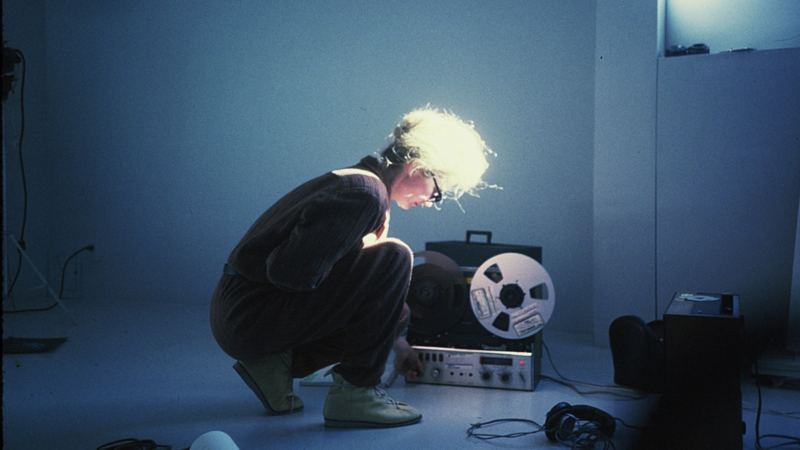— This event has already taken place —
Lectures on Maryanne Amacher
With Amy Cimini, Bill Dietz, Julia H. Schröder, Edwin van der Heide and Kevin Parks
—
Mon 28 July 2025, 10.00 – 17.00
Lichtenbergschule (Mensa)

PROGRAMM / PROGRAM
10.00
Welcome:
Amy Cimini & Bill Dietz
10.15
Bill Dietz:
“I must discover actual ways of destroying their existence perceptually”
11.15
Julia H. Schröder:
Maryanne Amacher’s Scientific Interests
12.15
Lunch break
13.15
Edwin van der Heide:
Maryanne Amacher’s “Plaything”
14.15
Amy Cimini:
Listening in the Drift
15.15
Kevin Parks:
Accessing the Past, Shaping the Future: The Maryanne Amacher Archive and the New York Public Library (via Zoom)
16.15
Roundtable with all Speakers
17.00
Conclusion
Gefördert durch die Kulturstiftung des Bundes
Funded by the German Federal Cultural Foundation
ABSTRACTS
Bill Dietz:
“I must discover actual ways of destroying their existence perceptually”
Can we understand Maryanne Amacher’s sound-centered œuvre as a practice of abolition? When the American artist writes, “I must discover actual ways of destroying their existence perceptually” (in her final published text, known as The Agreement), she is referring to loudspeakers. Bill Dietz is looking at the question of the degree to which this program of perceptual destruction can be extended to naturalized, culturally hegemonic modes of perception themselves.
Julia H. Schröder:
Maryanne Amacher’s Scientific Interests
Maryanne Amacher’s work is difficult to grasp. She used to install her loudspeakers in specific positions and mix her music on site. Her work titles seem to be cryptic. When reading her explanations and following her reading of scientific discoveries, her fascination with science becomes apparent and start to make sense. In the presentation, we will look at some examples of Amacher’s interest in science as evident from her artistic work.
Edwin van der Heide:
Maryanne Amacher’s Plaything
Unequivocally one the most magnificent musical mavericks of the 20th century. With the composition Plaything, Maryanne Amacher leaves to our mortal listening world one of her more personal live-to-multi-channel disc performances comprising one of her departures from structure borne sound. After studying with Karlheinz Stockhausen and working with John Cage, Amacher took off on her own psychoacoustic flight path, developing work that was critically described as: “hallucinating swarms of biological air from every direction”, “3D illusions of difference-tone ear dances where the sound seems to emanate from inside your own skull!” and “immense volumes that make the frequencies feel liquid – all-enveloping buzzing rumbles wrapped in sandstorm textures“. Through multiple residency periods with Recombinant Media Labs in 2000, Amacher designed a legendary ‘airborne audio’ Plaything composition. In this lecture we will look into and have a contextual look at what’s at play including an the in-ear-tones.
Amy Cimini:
Listening in the Drift
Spanning the early 1960 through the turn of the millennium, this talk engages Amacher’s approach to original presentational formats in existing and speculative media as approaches to sound and listening that conjoined real and imagined social worlds. In speculative, experimental fashion, this talk brings Amacher’s sonic projects into conversation with various, contested feminisms that coalesced in the 1980s and 1990s. From these conjunctures, this talk questions what music and sound studies wants from a contemporary Amacher and suggests interventions that perhaps move her conceptualizations of listening toward coalitional against surveillance and technofascism that lie beyond her immediate practice. In this, we find Amacher to be a critical theorist and prescient listener through not only the fractious technoscience of her own historical moment, but also, perhaps, of our own.
Kevin Parks:
Accessing the Past, Shaping the Future: The Maryanne Amacher Archive and the New York Public Library
This presentation explores the rich and innovative legacy of Maryanne Amacher through the recently acquired Maryanne Amacher papers at the Music and Recorded Sound Division of the New York Public Library. We will delve into Amacher’s groundbreaking work and ideas as well as her influence on contemporary experimental music and the ways in which her archive serves as a vital resource for researchers, artists and enthusiasts interested in experimental sound practices.
This archive is particularly complex and poses many questions about the archival process itself. We will give an update on the status of the collection and explore some of the questions that arise.